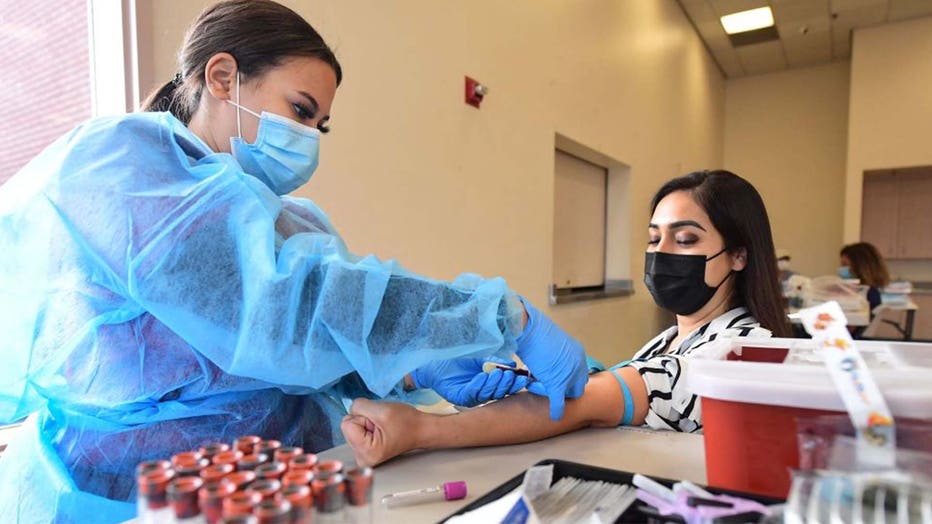CDC: US blood donations show COVID-19 antibodies increased 4x after vaccine rollouts
Blood donations in the United States revealed COVID-19 antibodies increased from 20.2% to 83.3% after vaccination rollouts, according to a recent study shared by the U.S. Centers for Disease Control and Prevention.
The study, which was published in JAMA on Sept. 2, observed blood donations between July 2020 and May 2021 and studied 1.4 million blood specimens.
Between July 2020 and December 2020, antibodies created in blood donors who were infected by the novel coronavirus increased from 3.5% to 11.5%.
Once the U.S. Food and Drug Administration authorized emergency use of COVID-19 vaccines and official vaccination rollouts began in December for the greater population, antibodies in blood donors increased 83.3%, the study said.
RELATED: C.1.2 variant: New coronavirus strain has highest mutation rate yet, study says
The study also found that infection-induced antibodies were more prevalent in the Hispanic and Black populations as opposed to Asian and White populations.
Researchers posited that the reason for this was that Asian and White populations were getting the COVID-19 vaccine at higher rates than Hispanic and Black communities.
Further study needs to be done comparing infection-induced and vaccine-induced antibodies and how long they last in the body. Researchers also noted that the study was limited on data comparing antibody longevity and effectiveness against new variants of the COVID-19 virus.
As new cases begin to average at uncomfortably high numbers once again, federal health officials are urging people who have yet to get vaccinated to get their shots, even more so for those who were once infected with COVID-19 and recovered.

FILE - Health care worker draws blood from patient during the new FDA emergency use and authorized IgG ll Antibody Test for vaccinated people.
RELATED: After COVID-19 puts him in ICU, Minnesota man says skipping vaccine is his life's 'biggest regret'
In early August, the CDC released a report that added to growing laboratory evidence that people who had one bout of COVID-19 get a dramatic boost in virus-fighting immune cells — and a bonus of broader protection against new mutants — when they’re vaccinated.
"If you have had COVID-19 before, please still get vaccinated," said CDC Director Dr. Rochelle Walensky. "Getting the vaccine is the best way to protect yourself and others around you, especially as the more contagious delta variant spreads around the country."
According to a new Gallup survey, one of the main reasons Americans cite for not planning to get vaccinated is the belief that they’re protected since they already had COVID-19. From the beginning, health authorities have urged survivors to get the broader protection vaccination promises. While the shots aren’t perfect, they are providing strong protection against hospitalization and death even from the delta mutant.
Meanwhile, plans to start delivery of booster shots by Sept. 20 for most Americans who received the COVID-19 vaccines are facing new complications that could delay the availability of third doses for those who received the Moderna vaccine, health officials announced on Friday.
RELATED: Atlanta man contracts COVID-19 breakthrough infection months after being vaccinated
President Joe Biden announced last month that his administration was planning for boosters to be available for all Americans who received the mRNA vaccines in an effort to provide more enduring protection against the coronavirus, pending approvals from the CDC and the FDA.
Those agencies, though, are awaiting critical data before signing off on the third doses, with Moderna's vaccine increasingly seen as unlikely to make the Sept. 20 milestone.
According to one official, Moderna produced inadequate data for the FDA and CDC to recommend the third dose of its vaccine and FDA has requested additional data that is likely to delay those boosters into October. Pfizer, which is further along in the review process, in part because of data collected from the vaccine's use in Israel, is still expected to be approved for a third dose for all by Sept. 20. A key FDA panel is to review Pfizer’s data on boosters on Sept. 17.
Data for boosters on Johnson & Johnson’s single-dose vaccine won’t be available for months, since that shot wasn’t approved until February, officials said.
RELATED: COVID-19 ‘mu’ strain: WHO tracks latest ‘variant of interest’
Dr. Janet Woodcock, the acting FDA commissioner, and Walensky briefed White House COVID-19 coordinator Jeff Zients and other officials about the expected Moderna delay on Thursday, officials said.
Most of the 206 million Americans at least partially vaccinated against COVID-19 received the Pfizer shot, but about 80 million received the Moderna vaccine, according to CDC data.
The Associated Press contributed to this report.

